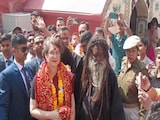A week after Hindi scholar Francesca Orsini was deported from Delhi for violating visa conditions, senior Congress leader Shashi Tharoor has said the Indian establishment "needs to grow a thicker skin, a broader mind and a bigger heart".
Tharoor was responding to a column by former BJP MP Swapan Dasgupta, in which he said that the State must ensure compliance but has no business assessing a professor's scholarship. "India must guard against any impression it has closed its doors on foreign scholars," Dasgupta said.
Sharing the post, Tharoor said he agrees with Dasgupta. "Rolling out an 'unwelcome mat' at our airport immigration counters to deport foreign scholars and academics because of trivial visa violations is doing us far more damage - as a country, a culture and an internationally-credible nation - than any number of negative articles in foreign academic journals could ever accomplish," he said. "Official India needs to grow a thicker skin, a broader mind & a bigger heart," Tharoor added in the post on X.
Orsini, a professor emerita at the School of Oriental and African Studies at the University of London, was deported from Delhi airport on October 21 for allegedly violating visa conditions. She had arrived from Hong Kong and was denied entry into India.
Officials said she was on a tourist visa and was blacklisted in March after she violated visa conditions. "This is a standard global practice that if a person is found violating visa conditions, he/she can be blacklisted," news agency PTI quoted a source as saying.
According to the government's guidelines, foreign nationals shall be required to strictly adhere to the purpose of visit declared while submitting the visa application.
Orsini, an Italian national, earlier taught at Cambridge before moving to the University of London. She has worked extensively as a Hindi scholar and is also known for her book, The Hindi Public Sphere 1920-1940: Language and Literature in the Age of Nationalism. Her deportation drew sharp responses from historians and intellectuals.















